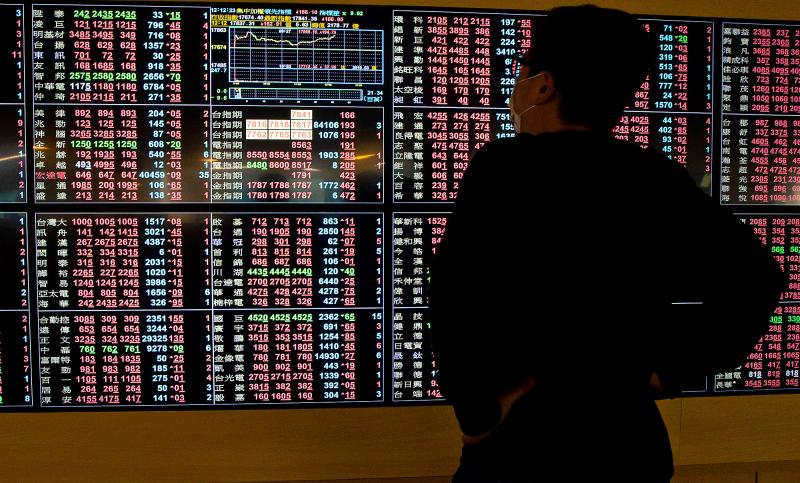Taiwanese shares moved higher yesterday on a technical rebound, but the gains were capped by a late sell-off of large-cap semiconductor stocks, dealers said.
Turnover also remained low as investors worried the US Federal Reserve could follow a tighter monetary policy after the US on Friday reported stronger-than-expected job data for last month, they said.
The bellwether electronics sector and transportation stocks initially led the upturn before profit-taking emerged.

Photo: CNA
Buying rotated to select old-economy stocks and some financial stocks, lending support to the broader market, the dealers added.
The TAIEX closed up 53.39 points, or 0.32 percent, at 16,605.96. Turnover totaled NT$210.28 billion (US$7.15 billion), with foreign institutional investors selling a net NT$2.21 billion in shares on the main board, Taiwan Stock Exchange data showed.
“Look at today’s turnover. I think market sentiment remained cautious after the US’ May non-farm payroll data. Many investors appeared reluctant to chase prices for the time being,” Hua Nan Securities Co (華南永昌證券) analyst Lu Chin-wei (呂晉維) said.
“Caution over a more aggressive rate hike cycle in the US continues to weigh on American stock markets, and investors here are nervous that further US volatility will send ripples through other stock markets, including Taiwan’s,” Lu said.
“As the US dollar continues to strengthen due to the Fed’s interest rate hikes, it is unlikely foreign institutional investors will resume heavy buying of shares in Taiwan any time soon,” he said.
The New Taiwan dollar declined NT$0.027 to close at NT$29.415 against the US dollar in Taipei trading yesterday.

South Korea’s equity benchmark yesterday crossed a new milestone just a month after surpassing the once-unthinkable 5,000 mark as surging global memory demand powers the country’s biggest chipmakers. The KOSPI advanced as much as 2.6 percent to a record 6,123, with Samsung Electronics Co and SK Hynix Inc each gaining more than 2 percent. With the benchmark now up 45 percent this year, South Korea’s stock market capitalization has also moved past France’s, following last month’s overtaking of Germany’s. Long overlooked by foreign funds, despite being undervalued, South Korean stocks have now emerged as clear winners in the global market. The so-called “artificial intelligence

‘SEISMIC SHIFT’: The researcher forecast there would be about 1.1 billion mobile shipments this year, down from 1.26 billion the prior year and erasing years of gains The global smartphone market is expected to contract 12.9 percent this year due to the unprecedented memorychip shortage, marking “a crisis like no other,” researcher International Data Corp (IDC) said. The new forecast, a dramatic revision down from earlier estimates, gives the latest accounting of the ongoing memory crunch that is affecting every corner of the electronics industry. The demand for advanced memory to power artificial intelligence (AI) tasks has drained global supply until well into next year and jeopardizes the business model of many smartphone makers. IDC forecast about 1.1 billion mobile shipments this year, down from 1.26 billion the prior

Chinese artificial intelligence (AI) start-up DeepSeek’s (深度求索) latest AI model, set to be released as soon as next week, was trained on Nvidia Corp’s most advanced AI chip, the Blackwell, a senior official of US President Donald Trump’s administration said on Monday, in what could represent a violation of US export controls. The US believes DeepSeek will remove the technical indicators that might reveal its use of American AI chips, the official said, adding that the Blackwells are likely clustered at its data center in Inner Mongolia, an autonomous region of China. The person declined to say how the US government received

FORTUNES REVERSED: The new 15 percent levies left countries with a 10 percent tariff worse off and stripped away the advantage of those with a 15 percent rate In a swift reversal of fortunes, countries that had been hardest hit by US President Donald Trump’s tariffs have emerged as the biggest winners from the US Supreme Court’s decision to strike down his emergency levies. China, India and Brazil are among those now seeing lower tariff rates for shipments to the US after the court ruled Trump’s use of the International Emergency Economic Powers Act to impose duties was illegal. While Trump subsequently announced plans for a 15 percent global rate, Bloomberg Economics said that would mean an average effective tariff rate of about 12 percent — the lowest since